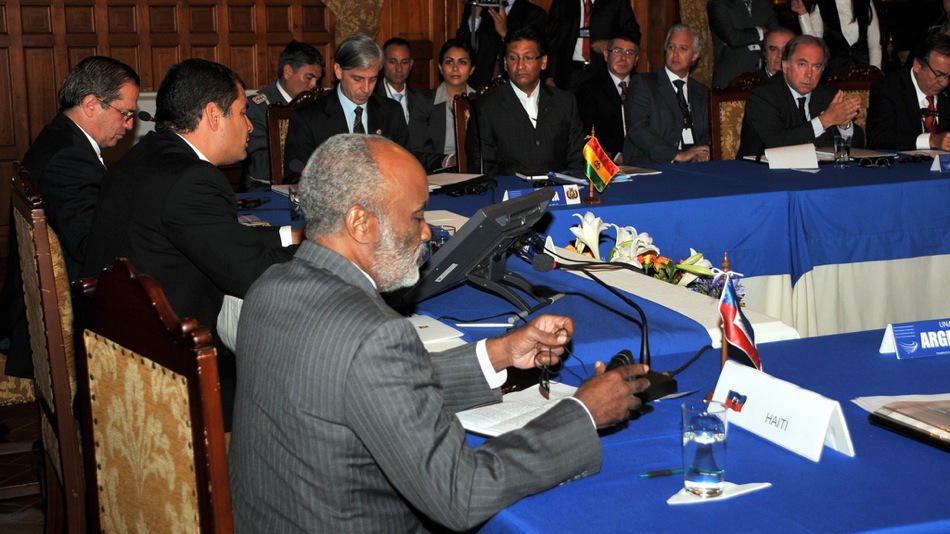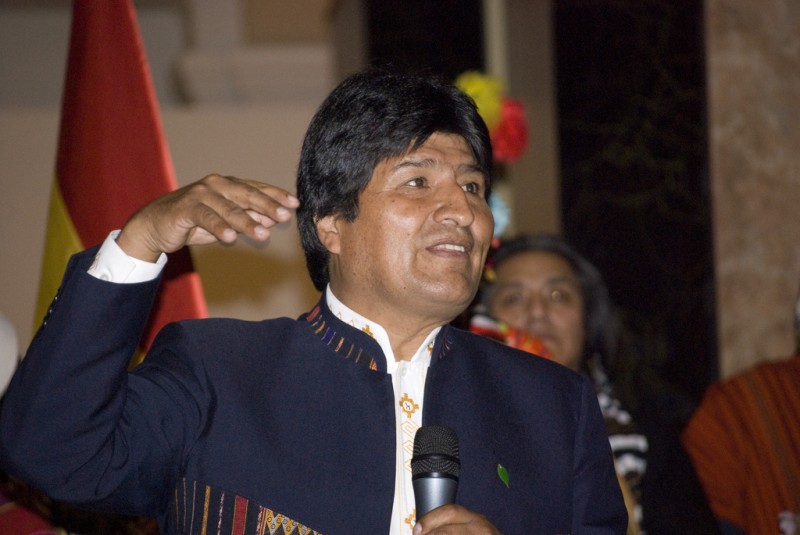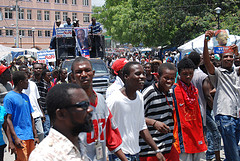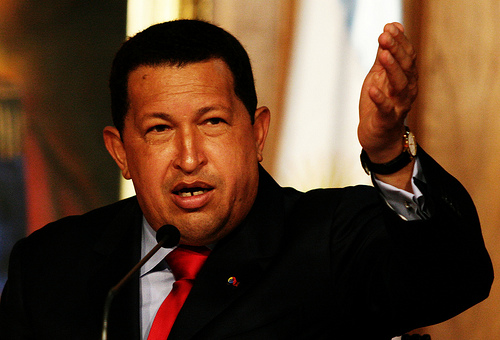
Latin America: Week in Review, Mexico
Mexican Drug Cartel May Have Ties To Police, Leaked Documents Indicate
May 12, 2010 By Staff
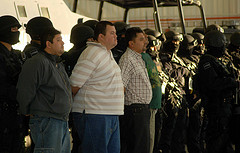
Mexican police arrested suspected members of Joaquín "El Chapo" Guzman's cartel in February.
Today in Latin America
Top Story — Documents recovered from Joaquín “El Chapo” Guzmán’s drug trafficking ring in Mexico indicate that the organization has ties to the country’s police, fueling fears of corruption.
Mexican daily Reforma reported on Monday that investigators found classified government documents in the possession of Roberto Beltrán Burgos — an alleged member of Guzmán’s Sinaloa cartel — after his arrest in May of last year. The documents detailed government investigations and military missions against the cartel, prompting speculation that Guzmán has avoided arrest because he knows when the authorities are coming for him.
“Obviously, he has information leaked to him before any raid,” Malcom Beith, a journalist writing a book about Guzmán, told The New York Times.
Ledgers allegedly containing the codenames of federal agents and police officers on the cartel’s payroll were also found among the documents. The Mexican authorities said they have not yet deciphered the codes.
One of Mexico’s former top anti-drug prosecutors, Samuel González, expressed skepticism over the government’s ability to meet President Felipe Calderón’s goal of rooting out police corruption before his term ends, according to The Associated Press.
“How are they going to clean up the force by 2012, if they continue to have this infiltration?” González said.
Just Published at the Latin America News Dispatch
- New York state is reviewing its deportation policies for immigrants facing minor criminal charges. Read more at the latest installation of Alison Bowen’s blog, Beyond Borders.
Headlines from the Western Hemisphere
North America
- The former Mexican governor of Quintana Roo who was extradited to the United States has plead not guilty to drug trafficking and money laundering charges.
- United Nations human rights experts criticized Arizona’s new immigration law, claiming that it may lead to police targeting people on the basis of ethnic origin.
Caribbean
- Puerto Rican police and federal agents raided a public housing complex and arrested more than three dozen people who allegedly run a $65 million drug ring.
- The U.S. is expected to offer $100 million in grants to fight AIDS in the Caribbean.
- Russian tourists are visiting Cuba in larger numbers out of nostalgia for the Soviet Union.
Central America
- Belize said it will stop sending appeals cases to the colonial-era British Privy Council, beginning June 1.
- United Nations specialist on health rights Anand Grover will visit Guatemala between March 12 and 18. He will focus primarily on indigenous people’s health and women’s health.
- Georgie Welcome will replace injured Carlo Costly on Honduras’ World Cup roster. Costly fractured his foot on Thursday and will be unable to play for six weeks.
- The six Nicaraguan banana workers who Dole Food Co. accused of fraud were allowed to explain their position on Tuesday, when their attorneys were to speak before a California judge at a hearing.
- 120 kilograms of cocaine were found hidden in a truck and four men suspected of drug-trafficking were taken into custody at the Nicaragua-Costa Rican border on Sunday morning.
- Panama’s Banco General S.A. reported its first-quarter profits were up 3.3 percent.
Andes
- Robinson Devia, a Colombian presidential candidate for the Voice of Conscious Movement, chained himself to statue of Simon Bolivar in Bogota and declared a hunger strike in protest to what he says is biased media coverage of his campaign.
- Venezuela’s legislature Tuesday introduced a bill aiming to tighten currency-trading rules in the hopes of reducing speculation and to “preserve the value” of the bolivar.
- Sports promoters in the Peruvian city of Huancayo celebrated Mother’s Day by putting on a boxing matches where mothers fought.
Southern Cone
- Spain’s Telefónica S.A. said Tuesday it offered 5.7 billion euros to Portugal Telecom in an effort to gain control of their Brazilian joint-venture. The action showed that global operators remain eager for a holding in Brazil’s telecommunications market.
- On Tuesday, the National Conference of Brazilian Bishops said it will prepare a manual containing guidelines to assist bishops in combatting child abuse committed by clergymen in the world’s largest Roman Catholic country. A special commission comprised of bishops, priest and psychologists will prepare the manual.
- Argentina’s bond prices are up, as of the end of the day on Tuesday, spurred by a bailout plan put forth by the E.U.
- A Pakistani man, Muhammad Saif-ur-Rehman Khan, was held under anti-terrorism laws on Tuesday after being arrested at the U.S. Embassy in Chile for having trace amounts of explosives on him.
- Access roads to Chile’s Collahuasi copper mine were cleared by subcontractors to avoid clashes with police. The move could end a five-day protest preventing work from proceeding at the mine.
- Argentina and Paraguay are refusing to cooperate in the production the latest project of Oscar-winning director Kathryn Bigelow, which reportedly looks at the two country’s mutual border region as a center for terror financing.
Image: Gobierno Federal @ Flickr.


